Order of the Zähringer Lion, I Class Knight with Swords
SKU: 01.BAD.0103.205.01
Estimated market value:
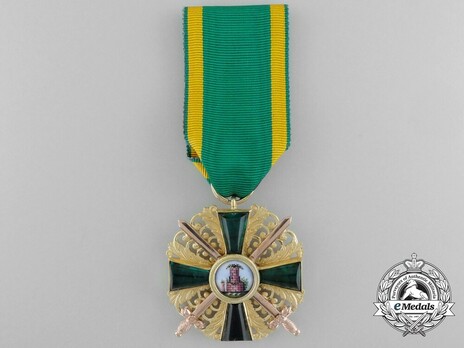
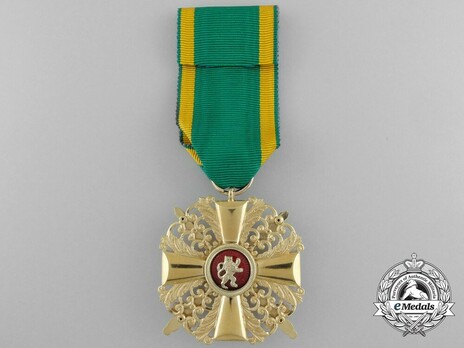
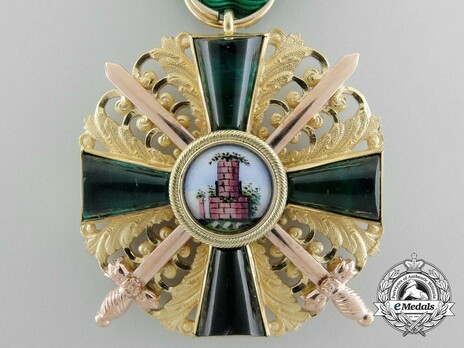
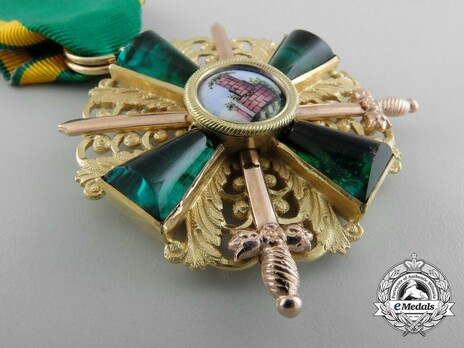
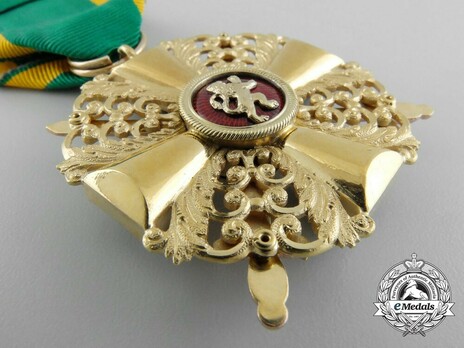
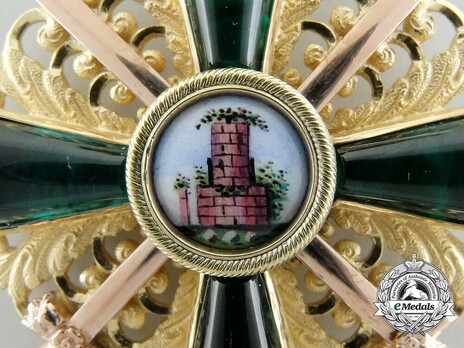
Estimated market value:
Attributes
Physical Description
A straight armed cross pattée constructed of gold or silver gilt and enamels. There are ornate arabesque designs in the quadrants between the arms. The arms of the cross are in green enamels. The obverse centre bears a circular medallion with the image of hand-painted ruins of the Stammschloss (family castle) Zähringen, encompassed by a gold border. The reverse bears a circular medallion with a lion rampant on a red enamel, background, encompassed by a gold border. With a loop for suspension, on a green ribbon with yellow stripes.
There are examples with the swords in the quadrants and swords on the ring.
History
The Order of the Zähringer Lion was established by Grand Duke Charles on December 26, 1812. It is also suggested by historians that the order was founded by Grand Duke Karl in 1809 and was named in honor of his ancestors, the Dukes of Zähringen. The Order of the Zähringer Lion was awarded to recognize civil and military merit. The first order conferral ceremonies took place in 1815. Members of the grand ducal house were born members of the order.
The order originally featured three classes: Grand Cross (and Grand Cross Breast Star), Commander and Knight. In 1815, surmounting golden oak leaves could be awarded with all classes to indicate additional merit and achievements. The oak leaves originally included an “L” cipher, but it was eventually discontinued in 1866. On June 17, 1840, the statutes of the Order were officially instituted by Grand Duke Ludwig. At that point, the Commander class was divided into I Class Commander (and I Class Commander Breast Star) and II Class Commander. In 1866, the Knight class was divided into I Class and II Class Knight. Swords were also instituted to indicate war merit. The first collar was awarded in 1868.
In 1879, the statutes were altered to permit a cross with swords to be worn beside a higher rank awarded later. Grand Duke Friedrich I also determined that Officers and war officials of the Grand Ducal Army Corps, who were bearers of the Order of Military Merit of Charles Frederick and the Order of the Zähringer Lion had to carry the latter with swords. On the occasion of Grand Duke Friedrich I’s 25 year governing jubilee in 1877, the order grew to six classes as the Knight of the Order of Berthold I was added. On April 29, 1889, a Merit Cross was added as an order grade to reward civilians for exceptional bravery and merit. The addition of the Knight of the Order of Berthold I was separated from the Order of the Zähringer Lion in its own order on September 9, 1896.
Recipients of the order could incorporate the insignia of the order into their coat of arms. If a person upgraded a class or died, the order had to be returned. The awards without swords were conferred for civil merit, while the awards with swords were conferred to recognize military merit.
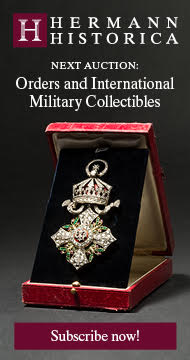
Versions
$1,550 USD
Gold/Enamelled
39mm; 46x3mm (swords)
This version is constructed of gold and the swords lay between the cross arms. A total of 718 were awarded, 525 of those during WWI.
$1,350 USD
Silver gilt/Enamelled
39mm; 46x3mm (swords)
This version is constructed of silver gilt and the swords lay in the quadrants between the arms.
$12,000 USD
Gold/Enamelled
On this version, the swords are placed between the suspension ring and the upper cross arm. A total of three were awarded.
$2,100 USD
Gold/Enamelled
39x61mm; 21x22mm (oak leaves); 48x2.5 (swords)
This version has an oak leaf suspension and the swords between the arms. A total of 244 were awarded, 138 of which during WWI.
$1,400 USD
Silver/Silver gilt/Enamelled
This version is constructed of silver gilt and bears an oak leaf suspension.
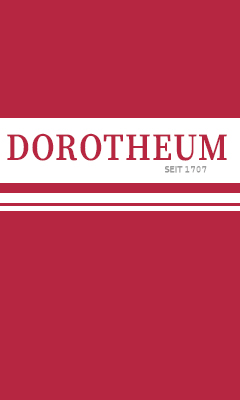

Comments
Sign in to comment and reply.
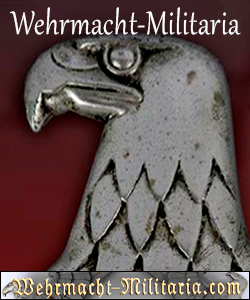
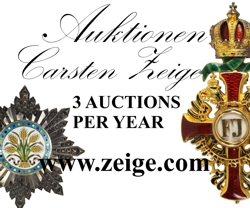
Scroll Top